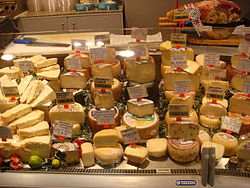
A private good is defined in economics as "an item that yields positive benefits to people"[1] that is excludable, i.e. its owners can exercise private property rights, preventing those who have not paid for it from using the good or consuming its benefits;[2] and rivalrous, i.e. consumption by one necessarily prevents that of another. A private good, as an economic resource is scarce, which can cause competition for it.[3] The market demand curve for a private good is a horizontal summation of individual demand curves.[4]
Unlike public goods, such as clean air or national defense, private goods are less likely to have the free rider problem, in which a person benefits from a public good without contributing towards it. Assuming a private good is valued positively by everyone, the efficiency of obtaining the good is obstructed by its rivalry; that is simultaneous consumption of a rivalrous good is theoretically impossible. The feasibility of obtaining the good is made difficult by its excludability, which means that is people have to pay for it to enjoy its benefits.[5]
One of the most common ways of looking at goods in the economy is by examining the level of competition in obtaining a given good, and the possibility of excluding its consumption; one cannot, for example, prevent another from enjoying a beautiful view in a public park, or clean air.[6]
- ^ Nicholson, Walter (2004). Intermediate Microeconomics And Its Application. United States of America: South-Western, a division of Thomson Learning. p. 59. ISBN 0-324-27419-X.
- ^ Ray Powell (June 2008). "10: Private goods, public goods and externalities". AQA AS Economics (paperback). Philip Allan. p. 352. ISBN 978-0-340-94750-0.
{{cite book}}: CS1 maint: date and year (link) - ^ Hallgren, M.M.; McAdams, A.K. (1995). "A model for efficient aggregation of resources for economic public goods on the internet". The Journal of Electronic Publishing. 1. doi:10.3998/3336451.0001.125. hdl:2027/spo.3336451.0001.125.
- ^ "Public Goods: Demand". AmosWEB Encyclonomic WEB*pedia. AmosWEB LLC. Retrieved 23 October 2011.
- ^ Malkin, J.; Wildavasky, A. (1991). "Why the traditional distinction between public and private goods should be abandoned". Journal of Theoretical Politics. 3 (4): 355–378. doi:10.1177/0951692891003004001. S2CID 154607937.
- ^ "Rivalry and Excludability in Goods". Living Economics. Retrieved October 22, 2011.